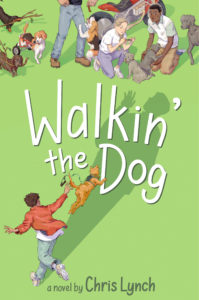“Be Kind to the Language”
“Wee cliche.”
I have written those words in the margin of my students’ work so many times it is bordering on becoming a wee cliche itself (bordering on? I hear my students cough). To avoid that, I occasionally drop the “wee” part for variety. But the wee is in there for good reason; to call something cliche is among the most stinging critiques one can make of a writer. We are, after all, striving for originality at all times in our work, so to call cliche at somebody is tough stuff. That is one reason I added the wee in the first place—to soften the blow.
But there is another important reason, and that is the fact that I’m usually not flagging one of the big, whopping clichés like “It was a dark and stormy night,” known to writing students the world over. My vigilance is overwhelmingly applied to the small, apparently harmless, turns of phrase that pop up all over our writing without our even noticing. Yes, I include myself in this (boy, do I love editors and editing).
But they are not harmless, are they? As I am known to point out to my students as I attempt to talk them out of hating me: those very small over-common terms and phrases that infect our sentences are the equivalent of termites eating away at the foundations of our prose. They are insidious, and lethal. How many times do we read a piece and get to the end merely shrugging, thinking “That was okay, but it left no pleasant aftertaste”? Going back, you may well find that the language, the syntax, the rhythms (yes, there are cliches of pace and rhythm and theme) are so samey compared to what I have read before. If that is your own writing you are going over, look for all the easy choices, the phrases like broad daylight or a twinkle in his eye, that you almost certainly would not have fallen back on if you hadn’t already heard them a billion times in your life. As a dedicated mentor, I like to emphasize that having heard something a billion times is precisely why you do NOT want to repeat it. Even if it is not a literal repetition of something common, if you even feel like you have heard something before, then treat it as if you have. The joyful endgame here is that in almost every instance where I call out a wee cliche to my students, they come back at me with a fillip, a flipflop, a fandango that instantly stamps that sentence as theirs and nobody else’s.
Now, I am not a linguistic brute. I know these minor weakness of phrase are acceptable in everyday life. Social discourse is scarcely imaginable without them. But. Your creative writing is supposed to be your singularity. You get to lovingly labor over it and polish it until it fully represents you and your artful spirit. So, while you can say in conversation, it is what it is (if you MUST), once you have put it in writing you have expended five words to say exactly nothing. That is a fair description of what we aim to eliminate in a creative writing program.
And while we are at it, please stop using the word Dad as a pejorative? That hurts my feelings.
Publishing March 12th, 2024 by Simon & Schuster Books for Young Readers
About the Book: “Lynch is back and better, smarter, and funnier than ever.” —Jacqueline Woodson, National Book Award Winner
A boy learns how to be a friend from man’s best friend in this funny and moving middle grade novel about humans being able to change and dogs changing us from acclaimed author Chris Lynch.
In a family of strong personalities with very strong points of view, Louis is what his mother lovingly calls “the inactivist,” someone who’d rather kick back than stand out. He only hopes he can stay under the radar when he starts high school in the fall, his first experience with public school after years of homeschooling.
But when a favor for a neighbor and his stinky canine companion unexpectedly turns into a bustling dog-walking business, Louis finds himself meeting an unprecedented number of new friends—both human and canine. Agatha, a quippy and cagey girl his age always seems to be telling two truths and a lie. Cyrus, a few years his senior, promises he’s going to show Louis how to be a better person, whether Louis wants him to or not. And then there are the dogs: misbehaving border terriers, the four (possible stolen) sausage dogs, the rest of Louis’s charges, and a mysterious white beast who appears at a certain spot at the edge of the woods.
Dogs and human alike all seem to have something they want to teach Louis, including his menacing older brother who keeps turning up everywhere. But is Louis ready to learn the lesson he needs most: how to stop being a lone wolf and be part of a pack?
About the Author: Chris Lynch is the award–winning author of several highly acclaimed young adult novels, including Printz Honor Book Freewill, Iceman, Gypsy Davey, and Shadow Boxer—all ALA Best Books for Young Adults—as well as Killing Time in Crystal City, Little Blue Lies, Pieces, Kill Switch, Angry Young Man, and Inexcusable, which was a National Book Award finalist and the recipient of six starred reviews. Chris is the author of middle grade novel Walkin’ the Dog. He holds an MA from the writing program at Emerson College. He teaches in the creative writing MFA program at Lesley University. He lives in Boston and in Scotland.
Thank you, Chris, for these pointers to focus students’, and our, writing!



1 thought on “Author Guest Post: “Be Kind to the Language” by Chris Lynch, Author of Walkin’ The Dog”